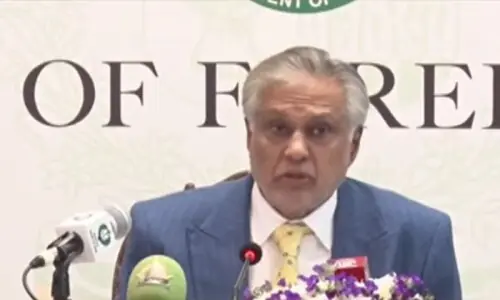KUNDUZ: A bomb blast ripped through a mosque during Friday prayers in northern Afghanistan, killing 33 people including children, just a day after the militant Islamic State group had claimed two separate deadly attacks.
Meanwhile, Taliban forces have arrested a suspected IS militant who allegedly had planned a bomb attack that killed at least 12 worshippers at a Shia mosque on Thursday, police said.
Balkh province’s police spokesman said Abdul Hamid Sangaryar was a key operative of the IS.
Since Taliban fighters seized control of Afghanistan last year after ousting the US-backed government, the number of bombings has fallen but IS militants have continued with attacks against targets they see as heretical.
A string of bombings rocked the country this week, with deadly attacks targeting a school and a mosque in Shia neighbourhoods.
Taliban arrest ‘mastermind’ of attack on Mazar-i-Sharif mosque
Taliban government spokesman Zabihullah Mujahid tweeted that children were among the 33 dead in the blast on Friday at a mosque in the northern province of Kunduz. “We condemn this crime... and express our deepest sympathies to the bereaved,” he said, adding that 43 more were wounded.
An intelligence official said on condition of anonymity that the explosion was caused by a bomb, but it was unclear how it was detonated.
An AFP correspondent saw large holes blown through the walls of the Sunni Mawlavi Sikandar mosque, popular with Sufis in Imam Sahib district, north of Kunduz city.
One side of the mosque was completely destroyed by the explosion.
“The sight at the mosque was horrifying. All those who were worshipping inside the mosque were either injured or killed,” Mohammad Esah, a shopkeeper who helped ferry victims to the district hospital, told AFP.
“I saw 20 to 30 bodies,” a local resident said.
‘Shrapnel injuries’
Relatives of victims arrived at the local hospital to look for their loved ones.
“My son is martyred,” screamed one man, while a woman accompanied by her four children searched for her husband.
A nurse told AFP over the phone that between 30 and 40 people had been admitted for treatment of wounds from the blast.
About a dozen ambulances ferried the seriously wounded to the main provincial hospital in Kunduz city. “The shrapnel injuries on the bodies of the wounded show they were caused by a bomb explosion,” a doctor at the provincial hospital told AFP.
Friday’s blast was one of the biggest attacks since the Taliban seized power on August 15 last year.
The deadliest was just days later when more than 100 Afghan civilians and 13 US servicemen were killed in a suicide attack at Kabul airport as tens of thousands were trying to flee the country.
IS claimed responsibility for that attack.
The regional IS branch in Sunni-majority Afghanistan has repeatedly targeted Shias and minorities like Sufis, who follow a mystical branch of Islam. IS a Sunni group like the Taliban, but the two are bitter rivals.
The biggest ideological difference between the two is that the Taliban sought only an Afghanistan free of foreign forces, whereas IS wants an Islamic caliphate stretching from Turkey to Pakistan and beyond.
The Taliban say they have arrested the “mastermind” of the attack on Shia mosque in Mazar-i-Sharif.
Shia Afghans, who are mostly from the Hazara community, make up between 10 and 20 per cent of Afghanistan’s population of 38 million. Taliban officials insist their forces have defeated IS, but analysts say the jihadist group is a key security challenge.
“Since the Taliban took power, the only achievement that they are proud of is the improvement in security,” said Hekmatullah Hekmat, an independent political and security expert.
“If that is not sustained and if they fail to restrain IS, then they will also be a failure like the previous government.”
Published in Dawn, April 23rd, 2022































